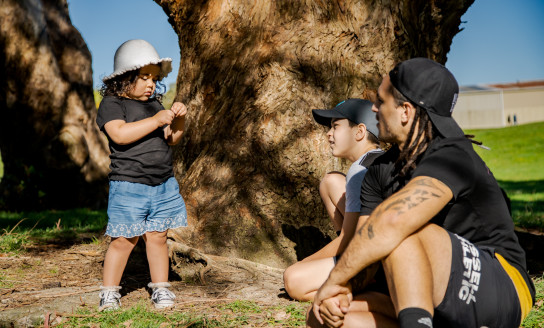Development three to four years
By three to four years old most kids:
- are more imaginative during play
- ask lots of ‘who’, ‘what’ and ‘why’ questions
- can remember nursery rhymes
- use three to five word sentences or more
- most people understand what your child says
- are toilet trained and can pull their pants up and down
- can feed themselves
- can put on shoes without laces and undo buttons
- can ride a tricycle using pedals
- can build a tower out of cubes.
Development four to five years
By four to five years most kids:
- can understand most of what you say
- can follow simple two to three step instructions like “can you find your shoes and put them on please?”
- are more independent
- can unscrew a lid from a jar
- know their own gender and age
- walk up and down stairs
- know the names of some shapes and colours
- can hold a pencil and copy some letters (by four years)
- dress and undress on their own
- use five to six word sentences or more
- most people understand what your child says
- enjoys listening to and telling stories.
Helping your child develop
There are some simple things you can do to help your toddler develop:
- let them play with other kids so they can learn how to make friends and socialise with other children
- encourage everyday skills like using a spoon and putting on their shoes
- talk to your child and name and talk about everyday things (kitchen items, food, toys) to develop their language skills
- give meaning to your child’s talking by listening and talking back to them
- read together, tell stories, sing songs and recite nursery rhymes to encourage their imagination and speech
- cook with your child to encourage their interest in healthy food.
Things to watch for in your child
Talk to a health care professional if you notice your child has any of the following issues.
If your child at three years old:
- doesn’t look you in the eye
- has issues seeing or hearing (there are some helpful hearing and vision developmental screening questions in your Well Child Book)
- doesn’t use three-word sentences
- doesn’t understand simple instructions – for example, ‘Please give me the ball’
- is hard to separate from you, or their primary caregiver
- isn’t interested in other children
- doesn’t play pretend
- is clumsy (e.g. trips a lot when walking or running)
- can’t handle small objects like a pencil or crayon
- can’t draw simple shapes like a circle or a square.
If your child at four years old:
- has trouble seeing or hearing
- can’t understand simple two-part instructions like ‘Put the spoon down, and pick your cup”
- has challenging behaviour (e.g. often has large tantrums over very small things)
- doesn’t play pretend
- is clumsy
- has trouble holding small objects like a pencil or crayon
- can’t draw shapes like a circle or a square
- has a hard time dressing on their own or using the toilet.
If your child at five years old:
- is hard to understand or doesn’t speak in full sentences
- can’t follow simple directions
- has inappropriate or challenging behaviour
- has no interest in letters or trying to write their own name
- is withdrawn, worried or depressed
- gets very upset when they are separated from you or their primary caregiver
- doesn’t interact well with other people (e.g. is aggressive or shows no interest)
- wets or soils their pants during the day (know night-time wetting can be normal up until six to seven years, especially for boys)
- has issues falling asleep at night or staying asleep.
